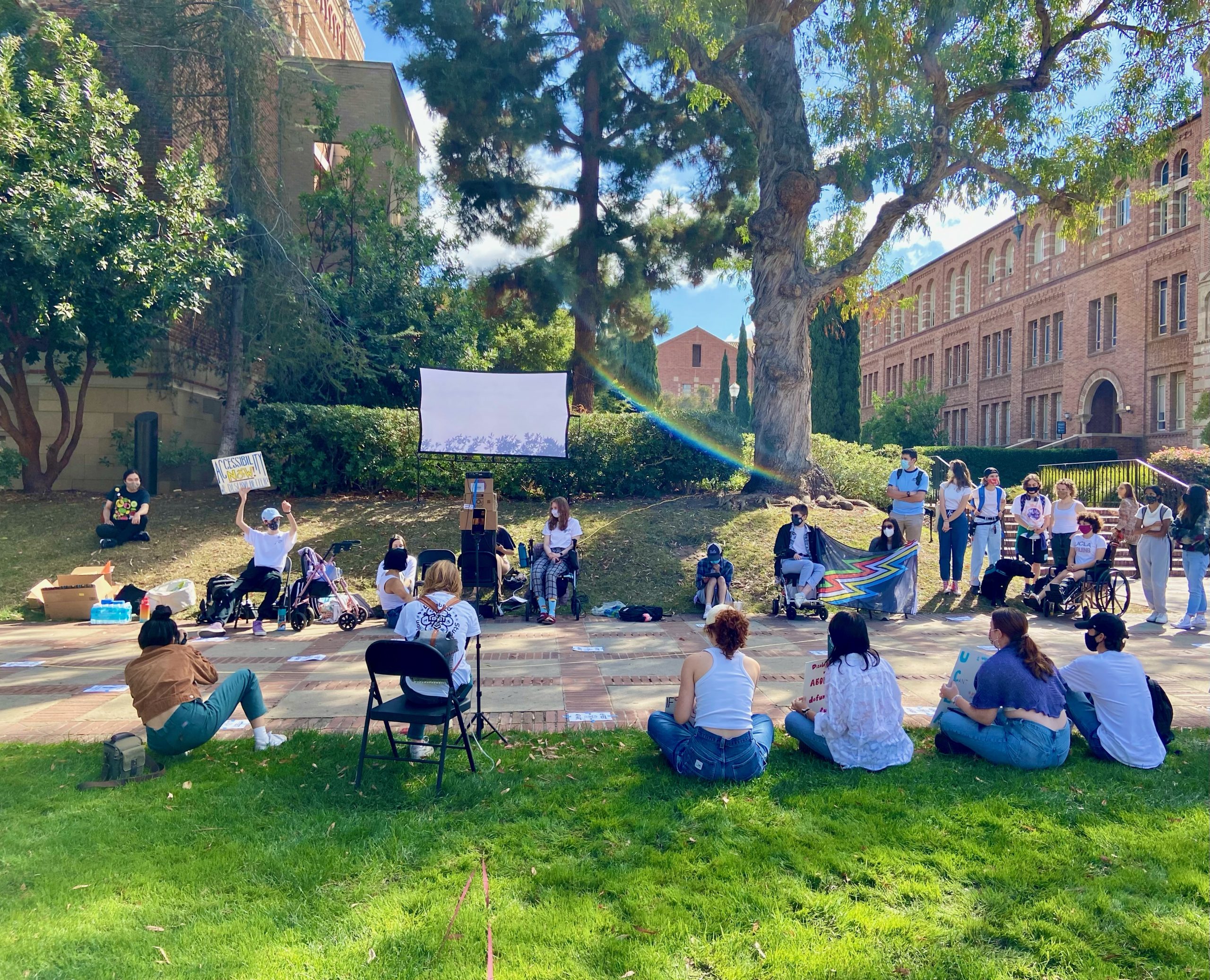Becoming Undeniable: Disabled Student Union Holds Protest for Remote Learning Access

Image Description: Around 23 people sit and stand around a white screen at UCLA’s Royce Quad during an accessibility protest. One person has his fist up and is holding up a sign that says “Accessibility Now! We deserve better!” Two individuals are holding a disability pride flag. Kaplan Hall and Powell Library are visible in the background.
We utilize identity-first language as aligned with the DSU’s and the larger disability justice movement’s usage of identity-first language and as laid out in FEM’s style guidebook.
As students walked to and from class last Friday, posters taped along the walkway announced, “This represents someone who couldn’t be here because UCLA has no remote access.”
On Oct. 8, 2021, UCLA’s Disabled Student Union (DSU) staged a hybrid protest near Kaplan hall and on Zoom, calling for an accessible education for all. Held in response to the administration’s refusal to offer remote learning options for disabled students and faculty, the DSU called out UCLA’s continual lack of support. With UCLA’s history of focusing on accommodations, rather than universal design, and dismissing disabled students’ needs (earlier this year, UCLA took away disabled students’ access to priority enrollment), the DSU’s protest for remote learning is their latest push to make UCLA a more accessible environment for disabled students, faculty, and staff. Specifically, the group is calling for the live-streaming and recording of all in-person lectures, abolishing attendance requirements, ensuring closed-captioning, and approving all TA and faculty requests for remote working.
Katie Bogue, a member of DSU, said during their speech, “The [Center for Accessible Education] provides students with accommodations, but they do not remove barriers… disabled students are already exhausted from navigating an ableist world. It is not easy to then fight tooth and nail for accommodations that take up precious time and energy, only for said accommodations to alienate… we are calling on UCLA, the number one public university, to remove one of the many barriers.”
Between speeches and chants, members of the DSU read testimonies by both disabled and non-disabled students detailing how the unavailability of remote learning has impacted their education. From immunocompromised students to those with at-risk family members to those who prefer in-person learning but understand the importance of remote learning as an option, the stories shared emphasized the importance of online learning.
DSU also welcomed several guest speakers to the protest, including James LeBrecht, co-director of the Oscar-nominated documentary Crip Camp; Rosemary Garland Thompson, English and Disability Studies professor and disability rights activist; and Leroy F. Moore Jr., activist, writer, and founder of Krip-Hop Nation and the National Black Disability Coalition. The speakers added their voices to DSU’s call for remote learning options.
LeBrecht said, “This is about keeping everyone safe. We are not in a ‘return-to-normal’ world. We are not ever going back to a [pre-pandemic] world… if we always listened to the people who thought they knew better for us, many of us would be in institutions today. But here we are… Despite a world that was never built for us, we are here, and we are never going to go away.” A pre-pandemic “normal” was one which continually disadvantaged disabled people. Disabled people deserve a new, inclusive present and future in higher education and in the world at large.
With 26,565 signatures amassed on DSU’s petition, the call for universal design and remote access in the classroom marks the largest movement for disability rights in the UC system since the 1977 504 Sit-in.
“A year and a half of remote learning proved that learning from home or asynchronously is a valid way to learn,” Bogue reminded attendees, “While it was not perfect for everyone, many disabled people saw the world open up to them like they never had before… Now, that world is being taken away again.” UCLA is more than capable of creating an accessible and welcoming environment for disabled students; it is time for them to follow through on their commitment to supporting all Bruins. To do so, as LeBrecht said, “We have to become undeniable.”




